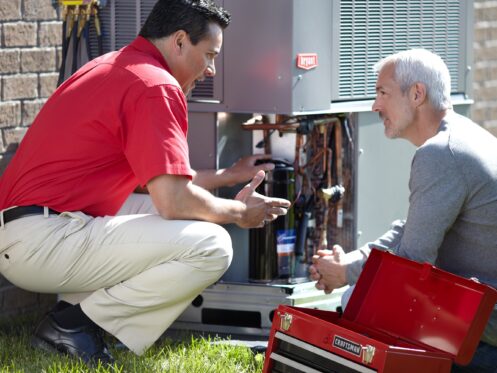Air conditioner maintenance checks are vital for the health of your unit and ensure that it runs efficiently. This process consists of several services and parts checks, all designed to keep your air conditioning unit in top working order. Find out what an AC maintenance check consists of, and why having one is important
1. Visual Inspection
A visual inspection involves looking at your air conditioner’s various components and systems to ensure they are in good working order. It can help identify potential issues before they become big problems that require costly repairs or replacement.
During a visual inspection, technicians will look for wear and tear on parts, leaks, improper connections, and other malfunctions that could affect your air conditioning system’s performance. They may also take note of any changes in temperature readings or humidity levels around the unit, which may indicate an issue with its operation. They may also check the airflow from your air conditioner to ensure it is working at its optimal level.
2. Check the Air Filter
Air filters are an essential part of any air conditioning system, as they help to remove harmful particles from the air. Checking your air filter regularly helps to keep your AC running at peak efficiency and can prevent long-term damage to the system. Look for any dust or dirt buildup on the filter, and replace it if necessary. If you notice any signs of a clogged filter, replacing it with a new one can help to restore your AC’s performance and efficiency.
Regularly checking and replacing your air filter ensures that the air in your home stays clean and free of contaminants, providing you with a healthier environment to live in. Additionally, maintaining a clean filter helps to reduce wear and tear on your AC unit, prolonging its life expectancy. Consider upgrading your air filter to a high-efficiency model, providing significantly better filtration and helping keep your home’s air clean.
3. Inspect the Evaporator Coil
The evaporator coil helps to cool down the air by removing heat from the indoor environment and transferring it outdoors. During operation, the refrigerant flows through the evaporator coil, allowing it to absorb heat before passing it outside. Over time, the evaporator coil can become dirty or clogged with dust and debris, which can cause it to function less efficiently.
As part of an air conditioner check, inspecting and cleaning the evaporator coil to ensure it works properly is important. Furthermore, a dirty evaporator coil can cause other components, such as the compressor and condenser, to fail if not checked regularly.
4. Check the Condenser Coil
A condenser coil helps transfer heat from inside the home to the outside air, removing hot air from the house’s interior and reducing temperatures in the living areas. The coil has a set of bent and interwoven tubes filled with refrigerant. Heat gets absorbed and released to the outside air as warm air passes through the coil. It is essential to regularly inspect and clean the condenser coils of an air conditioner to maintain proper system functioning.
Make sure to check for any blockages or accumulations of dust and debris that may be blocking the coil from operating properly. If the coils are dirty, they cannot effectively absorb heat or transfer it outside. Additionally, an expert will check for any signs of corrosion or rust, as these can indicate a leak in the system, leading to further issues.
5. Check the Refrigerant Level
Refrigerant helps to cool down the air in your home; without enough, your air conditioner won’t be able to do its job effectively. That’s why an expert technician will always check the refrigerant level during a routine maintenance visit. The technician will use specialized gauges to measure the pressure the refrigerant creates inside your system.
If there isn’t enough pressure, there isn’t enough refrigerant and they can add more if needed. On the other hand, if there is too much pressure, they may need to drain some out so that everything works properly again. It’s important to ensure that your refrigerant levels have balance for the best performance of your air conditioner. Without the proper levels, your system will not perform at its best, and you may have a costly repair bill.
6. Check the Blower Motor
The blower motor is an integral part of any air conditioner’s performance, as it helps to distribute the cooled air throughout a building. During an air conditioner check, an expert will carefully inspect the blower motor for any signs of damage or wear.
They may also lubricate it using appropriate lubricants to ensure the blower motor runs smoothly and efficiently. Having a properly lubricated blower motor helps to reduce the possibility of any damage caused by friction, which can lead to costly repairs or replacements. The goal is to ensure the smooth operation of the air conditioner and maximize its efficiency.
7. Check the Electrical Components
Electrical components checks include inspecting the wiring, switches, safety devices, and power supply. This inspection helps ensure that all components are in proper working order, as any loose or damaged wires can be dangerous due to potential shocks or fires. In addition, they will ensure that all wiring is up to code per local regulations and examine the main power supply for any potential issues. Furthermore, experts will look for loose terminals or connections and check the insulation on all wires and connections to ensure it is not compromised.
Also, the expert will test all components to determine if they are functioning correctly and repair or replace any malfunctioning parts. Lastly, an expert can assess the condition of the electrical circuits to ensure that the entire system is operating properly and safely. Doing so can drastically reduce the risk of electrical system failure or malfunction, which could lead to costly repairs down the line.
8. Test the Unit
Experts must ensure the unit functions properly when performing an air conditioner check. This means testing the unit’s ability to cool the air accurately and efficiently and ensuring all its components are working. A comprehensive unit test should visually inspect all internal and external components, such as the fan, compressor and evaporator.
The compressor should get checked for proper levels of oil and effective operation. Additionally, it is important to check the fan’s speed and rotation to ensure it works correctly. Lastly, the expert will test the unit’s efficiency by measuring how quickly it cools a room and comparing that to industry standards.
After completing the checks and tests, the expert must provide a written report of their findings and recommendations. This report should include a detailed description of any issues with the air conditioner and potential solutions if repairs or replacements are necessary. It is essential to provide this report to both the owner of the air conditioner, and anyone else who may work on it in the future. It contains crucial information about its current condition and potential problems that could arise. Contact Mackey Services for more information about our air conditioner inspection and reporting services. We also offer other services such as AC, installation, and heating, allowing you to enjoy a cool and comfortable environment all year round.





